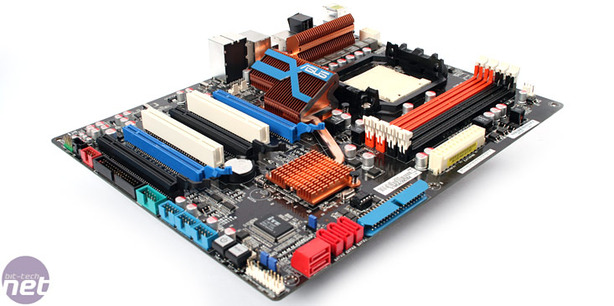Overclocking
The overclocking performance of the Asus board was really very good - out of three boards and three 720 Black Edition CPUs we recently tested, the Asus was able to hit a solid 3.7GHz - the limit of our CPUs, at 1.5V vCore but even up to 1.45V on the CPU-NB it wouldn't exceed a stable 2.4GHz on the CPU northbridge - coming up short against the MSI by 200MHz.AMD's OverDrive works better with the Asus than the other boards by actually allowing adjustments for memory, 790FX-NB and southbridge voltages, however there are still inherent limitations like the lack of CPU-NB performance adjustment.
We found that generally the Asus would overclock very easily, getting into its stride quickly, but the stability-instability factor dropped off far quicker than the MSI which could squeeze out 3.9GHz on the CPU cores and 2.8GHz on the northbridge, but couldn't quite keep it stable.
For those wanting a little more - there's still the CPU overvoltage jumper nestled into the bottom corner of the board as well, allowing up to 1.9V instead of 1.7V on the vCore - plenty of overhead for extreme cooling.
Conclusions
We can't but help feel that Asus has cut short this "Deluxe" motherboards. Previously they usually have everything under the sun on them - the Intel alternatives certainly do, so if I was AMD I'd be questioning Asus for the incomplete feature list.Just five SATA, only push-pins for the heatsinks, a single power phase for the memory, and not even a reset CMOS button? The extras like SAS and ExpressGate we couldn't care less about, and while the core setup is certainly good enough: four PCI-Express 2.0 x16 slots, great power delivery, plenty of rear I/O options and a solid BIOS, it's a small step back from the M3A79-T, which is anywhere from £5 to £20 cheaper.
The M3A79-T we know well is end of life now, but the M4A79 (non-T) is essentially a rebranded M3A79-T Deluxe, but with official support for Phenom II. The M4 is still the same price as the M3 too, which is good, but remember to double check the item being bought (-T versus no T), otherwise you could be left with more hassle exchanging a product.
Comparatively the Asus M4A79-T is only quite good value though compared to the Gigabyte GA-MA790FXT-UD5P - the Gigabyte has plenty more SATA but lacks four PCI-Express x16 slots, opting for x1s instead. Both are within £5 of each other and overall we feel both are equally balanced - equipped better in different areas: the Gigabyte is chief in hardware, but the Asus overclocks better. The MSI 790FX-GD70 on the other hand not only overclocks better, it performs the same as the Asus in everything bar CrossFire gaming and it's ever so slightly cheaper too.

Final Thoughts
While we slap Asus on the wrist for a hardly overwhelming "out the box feeling", we have to point out it's the only AM3 board that worked from the get-go. Everything worked without tricks or hacks, new core drivers or BIOS - that's a testament to Asus's R&D at least. In addition to this, Asus commands very strong performance figures, overall product quality and good overclocking. While better in some places, it lags in others when directly compared to the competition or even the older model it succeeded. A solid product, but not the best.- Features
- x
- x
- x
- x
- x
- x
- x
- -
- -
- -
- 7/10
- Performance
- x
- x
- x
- x
- x
- x
- x
- x
- x
- -
- 9/10
- Value
- x
- x
- x
- x
- x
- x
- x
- -
- -
- -
- 7/10
- Overall
- x
- x
- x
- x
- x
- x
- x
- -
- -
- -
- 7/10

MSI MPG Velox 100R Chassis Review
October 14 2021 | 15:04










Want to comment? Please log in.